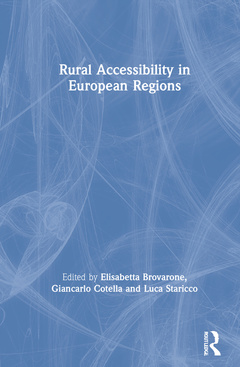Rural Accessibility in European Regions
Coordonnateurs : Vitale Brovarone Elisabetta, Cotella Giancarlo, Staricco Luca

Rural Accessibility in European Regions explores concepts, methodologies, and case studies dealing with accessibility in European rural areas, embracing cultural, socioeconomic, and governance aspects that play a key role for accessibility policies in rural and peripheral areas.
In the first part, the chapters introduce rural accessibility challenges, present a methodology to support policymaking for enhancing accessibility in rural areas and apply it to case studies in the United Kingdom, Italy, Spain, and Sweden. In the second part, additional cases from Poland, Germany, Greece, and France provide alternative approaches to the topic, and a research agenda is proposed. Overall, the book contributes to a conceptualisation of rural accessibility, addressing challenges and potentials for rural accessibility and urban?rural relationships in European regions.
The book fills a gap in the existing bodies of literature on accessibility and on rural planning, bridging the two spheres with an interdisciplinary approach to rural accessibility for mobility, planning, and regional studies.
Foreword. Editors’ Preface.1. Rural Accessibility in European Regions: Exploring Uncharted Territory 2. Accessibility Challenges in European Rural RegionsPart I. Urban-Rural Connectivity: Understanding Phenomena, Framing Policies 3. A Multilayer Approach to Support Policymaking Towards Greater Accessibility 4. Accessibility and Urban-Rural Connectivity in Marina Alta, Spain: Raising Awareness, Identifying Key Policies 5. Accessibility and Social Exclusion in Peripheral Territories: The Case of Scarborough, United Kingdom 6. Improving Accessibility to Reverse Marginalisation Processes in Valle Arroscia, Italy 7. Commuting and Labour Market Challenges in Swedish Sparsely Populated AreasPart II. Taking Up the Challenge: Experiences Across EU 8. Accessibility Dimensions and Changes in North-Eastern Poland: The Case of Podlaskie Region 9. Production Modes, Urban-Rural Relations and Rural Transport: North Pelion vis-à-vis Volos, Greece 10. "Bottom-Up" Mobility Services: Experiences with Community Transport in Germany 11. Bridging Tactics and Strategies for Mobility in Mountain Areas: The Example of Briançon, France 12. Learning from Experience: Towards a Research Agenda on Rural Accessibility
Elisabetta Vitale Brovarone is a postdoctoral research fellow in spatial planning at Politecnico di Torino, Interuniversity Department of Regional and Urban Studies and Planning (DIST). Her research focuses on mobility, land use–transport interaction, and accessibility. She is also interested in governance and local development in metropolitan, rural, and mountain areas. On these topics, she authored several publications, has had professional experiences, and took part in international research projects, among which are the recent Interreg ALCOTRA ARTACLIM – Adaptation and resilience to climate change in mountain areas, ESPON URRUC – Urban-Rural Connectivity in Non-Metropolitan Regions and ESPON METRO – The role and future perspectives of Cohesion Policy in the planning of Metropolitan Areas and Cities.
Giancarlo Cotella is an Associate Professor in spatial planning at Politecnico di Torino. His research focuses on European Union Territorial Governance, in particular on the mutual influence between European Spatial Planning and the territorial governance and spatial planning systems of the Member States. He published widely in the international scientific literature and took an active part in several international research projects, among which are the recent ESPON COMPASS – Comparative analysis of territorial governance and spatial planning systems in Europe, ESPON URRUC – Urban-Rural Connectivity in Non-Metropolitan Regions, ESPON SUPER – Sustainable Urbanization and Land-use Practices in the European Regions and ESPON METRO – The role and future perspectives of Cohesion Policy in the planning of Metropolitan Areas and Cities.
Luca Staricco is an Associate Professor in Spatial Planning at Politecnico di Torino. His main research fields are related to interactions between mobility and land use, coordination of spatial and transport planning, transit-oriented development, sustainable mobility, liveability of urban spaces, regional and urban resilienc
Date de parution : 09-2021
15.6x23.4 cm
Date de parution : 09-2021
15.6x23.4 cm
Thèmes de Rural Accessibility in European Regions :
Mots-clés :
Urban Rural Connectivity; Flexible Transport Services; Rural Areas; Accessibility Challenges; Urban Rural Linkages; Non-metropolitan Regions; Urban Rural Relations; Podlaskie Voivodeship; North Eastern Poland; Local Public Transport; DRT; Multi-modal Transport System; EU Cohesion Policy; Multimodal Transport System; Tourist Mountain Areas; CT Scheme; Scarborough Borough Council; Liguria Region; Highways England; CT Service; Inland Municipalities; North York Moor National Park; Local Development; National Accessibility; Traditional Public Transport



